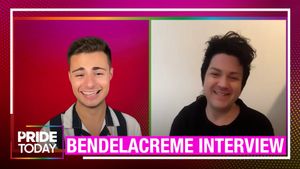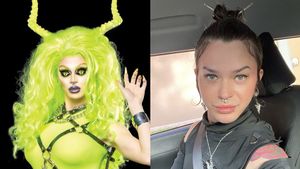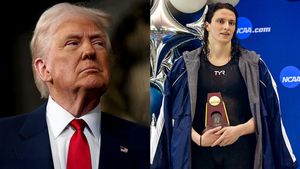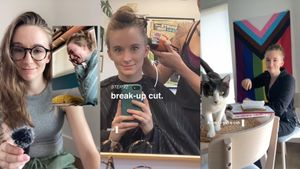Very few writers have been able to capture the power of modern female rage quite like Gillian Flynn. When Gone Girl exploded across pop culture, "Amazing" Amy Dunne became an antihero as great Walter White, Tony Soprano or Don Draper, an avatar for the simmering anger that would finally boil over with the birth of the #MeToo movement in 2017. This year's Sharp Objects, the critically acclaimed HBO adaptation of another Flynn novel, depicted the ways women inflict their pain on themselves, on each other and ultimately the world. Now, Flynn is turning that rage on the system itself in Widows, the Steve McQueen-directed and Viola Davis-starring heist film that follows four grieving women as they turn their anger against the system itself.
OUT talked to Flynn about her new film, subverting genres traditionally dominated by men and why she loves writing dangerous women.
The plot of Widows really unfolds like a novel, especially as you get to spend time with the characters and learn who they are. When you approach these different mediums -- film and prose -- do you still write in the same way?
I'm not a trained screenwriter, I certainly don't like to approach it in that formulaic way. I like to approach it like a story. What appealed to me about this was not the idea of doing a heist film. it was the idea that, in the same way that I do mysteries because I like mysteries, but that you can use a mystery as a really entertaining engine to attach all sorts of big ideas, in the way that I wanted to talk about marriage and gender and the false roles that we put on and play and did that with Gone Girl and the mystery of Gone Girl, in the way that I wanted to talk about female aggression and violence and rage and psychological harm, and did that with the mystery of Sharp Objects. The heist film, you can use that as the engine to talk about race and gender and economic power or lack thereof and the problems of big cities, so we wanted to approach all that and attach it to the engine of the heist.
So much of your work has been in these genres that are traditionally dominated by men, is it important to you to subvert the idea that these kinds of stories are owned by men?
I have to bow down to Lynda La Plante, she wrote the BBC series [Widows is based on] way back in the 80s, she was so far ahead of her time. People asked me if it was hard to update it and the answer is no, because that's how far ahead of her time she was. She was writing edgy, strong, complicated women way back then. We own her a big debt of gratitude for giving us the bones of this story. It did appeal to me; I will fully admit I have never loved heist films, probably because they have always felt so aggressively boys only in a way that other male-dominant films -- I love sports dramas and war dramas and westerns, but many of those have more to do with the human condition and I can identify with emotions that are being seen on-screen, whereas to me I've always felt like heist films...they've always felt almost uninvitingly boys clubby, and I have often not related to them.
So the idea of being able to subvert that genre was appealing to me, and that idea of, what does a heist look like when it's done by women? When I was pitching to Steve to be the writer on the project, I said that several of the widows should have kids, because I'd like to see what child care in the middle of a heist looks like. I don't want it to be glamorous, the stakes shouldn't be this pie in the sky, these women aren't suddenly going to be in mansions and furs and at the end we're going to see them all in a big shopping montage. It should be about just trying to get to the next level so they're not in survival mode anymore. I want it to feel relatable, they're not professionals, it should feel like at any moment they could really fuck this up. It's not that heist film we normally see where here's our safecracker, here's our computer guy. It should feel like, how the fuck do you do this? And the stakes are incredibly high.
You've made a name for yourself writing these dangerous women who have become avatars for female anger. Gone Girl especially feels like it in some way precipitated this cultural moment we're in where female anger is finally being validated.
That's a very interesting idea. It would be a very interesting exercise for someone to read Amy now, you'd be coming from a very different place reading her now in the scope if things. I can certainly tell you it felt great to write not one but four complicated, conflicted female characters who were the "heroes" of our story who were actually out to do a "bad thing," two of them were mothers and we're not getting any sort of pushback, "should moms really be doing this?" These are four women of different races who are talking to each other, so we're passing the Bechdel Test, they weren't talking about boys. This is a really amazing, fucking badass cultural moment that I'm really excited about. [These characters] weren't necessarily "likeable," they were fighting amongst themselves, they were pissed and they were as complicated as women are and it was great to have that moment of freedom to write that and for them to look like women you would see in America, they weren't these four consumable white women.
Widows and Sharp Objects were both released this year and depict two drastically different ways female pain is manifested: in Sharp Objects you have these women hurting themselves, hurting each other and in Widows you have these women who decide to take their anger out on the system instead. Do you see these two stories being in conversation with each other?
There are certainly conversations about how women experience pain, process it and inflict it. They were written, for me, at very different times. Sharp Objects was a book that I wrote 12 years ago as a woman of Generation X, it was about three generations of women and how they process feeling pain and rage. Widows, they way we were writing it now, is much more of its time, with women waking up and pushing back. There's a line in the trailer that I love from Michelle Rodriguez where she says, "If this all goes bad I want my kids to know I didn't just sit there and take it," which always makes me happy. It's a very different sentiment that what the women of Sharp Objects -- with the exception of Amma -- would say.
Do you think women need anger? Are we powerful when we're angry?
I think anger has power to it. It's how that anger is directed to be of use. Yes, it can be channeled in a really useful way and owning your anger is a much healthier way than swallowing it, turning it on yourself the way Camille does or the way Amma does, which is loosing it upon other people, which is almost a more male way of doing it. Women are starting to be much more able to figure out how to do it. But I read a study recently that there is a very clear correlation of women still being punished in an office situation for showing anger, that in any workplace environment male anger is still respected whereas female anger is still interpreted as losing control.
How does Widows fit in with the rest of your work?
It's in a really nice conversation with the other pieces. I'm proud because it's four women of different races who are, for all their flaws, interesting and strong. My whole goal as a writer is to never worry about writing good women, but to always write interesting women and to show women that represent all different kinds of women and keep that spectrum of womanhood wide and clear. Widows continues to broaden that, which I'm really proud of.
Widows is in theaters November 16.






































































